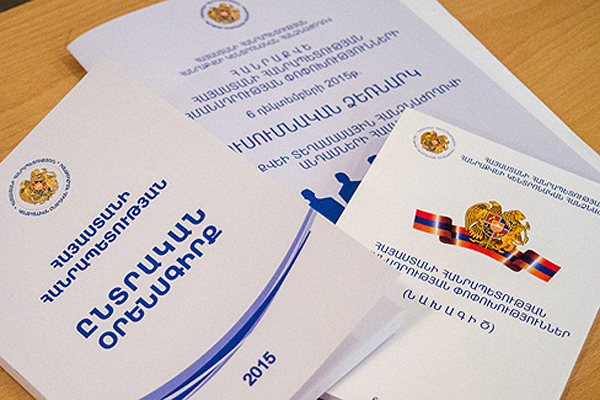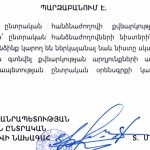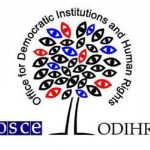- 11 May, 2016
- Useful resources, Elections

The Venice Commission of the Council of Europe has published a preliminary joint opinion of the Commission and OSCE/ODIHR on the RA Draft Electoral Code.
The main part of the 25-page document contains suggestions which are 8 in number (3 main and 5 additional suggestions).
Below you can find that particular section of the document.
“14. It is recommended to address the following key issues:
- The draft code establishes limitations and deadlines for the formation of coalitions after the first round of elections. These provisions unduly limit the possibility of building a political coalition as a means for ensuring the “stable majority” required by the Constitution. It is recommended to reconsider restrictions on the number of participants in a coalition and extend the time period for formation of coalitions after the first round.
- Concerns regarding the accuracy of voter lists and potential impersonation of voters de facto abroad underlie longstanding opposition and civil society calls to publish signed voter lists after election day. Publication of signed voters’ lists raises a number of concerns regarding privacy of information. The concerns expressed by civil society seem to have been at least partially addressed in the interim version of the draft code, through the possibility of accessing the list of voters who voted. Considering the importance of ensuring a balance between data protection and the secrecy of the vote on the one hand and stakeholders’ interest in consulting the signed voter lists on the other, it is recommended, as a confidence building measure, to allow meaningful consultation of signed voter lists by stakeholders under specific conditions.
- The draft code envisages the introduction of new technologies in respect of voter registration and identification. It is welcome that voter registration and identification issues are addressed, but the proper implementation of new technologies has to be ensured. Particularly in light of the short time before the next elections and the need to build trust in the electoral process, it is recommended that a number of issues be thoroughly considered, including harmonising new provisions with existing data protection laws and standards, applying proper procedures for procurement, ensuring public testing and certification of the equipment, guaranteeing contingency planning, providing sufficient training for electoral staff, and ensuring effective awareness-raising among voters and political parties. A gradual approach to the introduction of such technologies through a series of pilots would be a measure to enhance confidence in the system and provide opportunities to address technical issues regarding effective implementation. Initial pilots could take place, for example, during the upcoming local elections.
- Additional recommendations include:
- The draft code establishes or maintains restrictions on citizen election observers which may impede their activity and undermine transparency of the electoral process. It is recommended to remove the mandatory testing and certification of citizen observers, as well as the requirement that the charters of citizen observer organisations be in force for the three years preceding the elections, as this would deprive new organisations of the possibility to observe elections.
- The code should further guarantee the independence of the electoral administration, notably, by ensuring that presidential powers to nominate members of the Central Electoral Commission in case of a parliamentary stalemate are exercised in consultation with all parliamentary parties and by clarifying the procedure for the early termination of mandate.
- While the draft code improves the previous gender quota for candidate lists, increasing it from 20 to 25 per cent within certain brackets of the list, the impact might be limited. It is recommended that the draft code provide for a still more effective quota for women’s representation, for example by placing women among every two or three candidates.
- Particularly in light of the extensive changes to the electoral system, the draft code would benefit from simplifying and clarifying procedures for voting, counting and tabulation, as well as the determination of election results. This would also require extensive training for electoral staff and comprehensive voter education well in advance of elections to ensure better understanding of the process and enhanced public confidence.
- Electoral reform requires broad and public discussion in order to encourage participation in the process and acceptance of the outcomes. Final amendments to the code should ensure meaningful engagement with all relevant stakeholders, so as to encourage broad agreement and support for the new code.”


 Հայ
Հայ Рус
Рус


